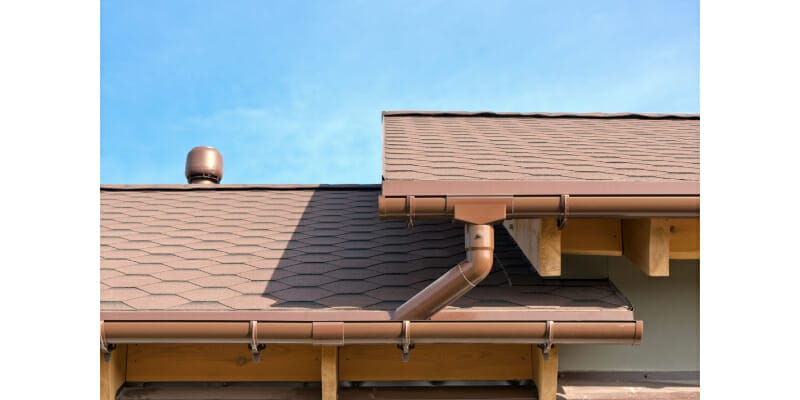Disclaimer: This post may contain affiliate links, meaning we get a small commission if you make a purchase through our links, at no cost to you. For more information, please visit our Disclaimer Page.
Gutters are important for keeping water from damaging your home and property, but how long can you go without them?
A house can stay for a short time without gutters. However, it won’t stay put for long unless your home has unique qualities like no basement and an excellent drainage system. Gutters help drain water away from your house. Additionally, a house with no gutters usually has low resale value.

Gutters are essential, although some homes don’t need them. Even then, whether you have gutters or not, you need to look for ways to drain off rainwater from your roof and walls.
Also, depending on the gradient of the land on which your house sits, you may want to add gutters to ensure water flows in the right direction. You don’t want stagnant water in your yard or front porch.
Read on to find out more about gutters and why you need them for your house.
Table of Contents
What Happens If Your House Has No Gutters?
A house with no gutters or a flawed gutter system will be affected. Here is what happens if your home has no gutters.
Stagnant water near the house
Gutters help drain and direct water away from your house. Stagnant water puddles around your house are not only unsightly but also dangerous. If left for long, these pools of water are breeding grounds for mosquitos and other bugs.
Plus, if your house has no gutters, you will always have pools of water around the foundation and sometimes in the basement whenever it rains.
Water staining, streaking and splattering on your siding
Water spots around the house siding are an eyesore. Gutters will help avoid this. Water stains are also expensive to get rid of in the long run.
Water flowing to parts of backyard that you prefer to keep dry
Nothing spoils the beautiful look of your lawn like runoff water. Gutters help direct water to designated drainage points.
Without them, water will flow according to how the natural landscape is. Your land’s gradient and natural force of gravity will determine where rainwater flows to; therefore, don’t be surprised to find some water puddles on your doorstep or driveway.
Sliding doors & windows will have splattering rainwater and mud
Gutters help prevent rainwater, dirt, and mud from reaching your sliding doors and windows. Without them (gutters), you will always be cleaning off mud and wiping watermarks from your doors and windows.
Water can ruin your wall insulation
You risk damaging your wall insulation if your house has no gutters. Water can cause shots and other damages to your insulation. Water infiltration will also cause the paint on your walls to start chipping and peeling off.
Mold and mildew
If your walls and foundations are in constant contact with water, the chances of mold and mildew growing on them are very high. A house without gutters is likely to develop unpleasant growth of mold, mildew, and other moist areas vegetation.
These may be dangerous to you since they look unsightly and are breeding grounds for bugs. The air quality in your house will also reduce. Your basement, for instance, will become dark and stuffy.
Cracks on the foundation
Stagnant water on your foundation is likely to cause cracks. Gutters help keep your foundation dry and free from cracks.
Flooding basements
Issues such as poor piping, damaged foundations, and wrong lot grading can cause your basement to flood. If your foundation is damaged and there is no proper gutter system to drain water.
Some of it will leak through the cracks and flood your basement.
A flooded basement can turn into a diseases breeding ground and even encourage pest infestation.

How Long Can A House Go Without Gutters?
As mentioned earlier, you can choose whether or not to put gutters on your house. A house without gutters will not stand the test of time since water will likely damage its walls and weaken the foundation.
Nonetheless, some specially designed houses don’t need gutters. For instance, if your house sits on an excellently landscaped piece of land, then you may not need gutters.
Professional landscaping is crucial for proper water drainage. Good landscaping will ensure that even without gutters, water drains off your house and property. Also, you may not need gutters if your home has no basement.
Luckily, thanks to gravity, you can still get away with having no gutters on your house. The force of gravity will help pull water off your walls and aid in drainage.
Gutters are the raincoats of your house. Therefore it is vital to have them installed, especially during the rainy seasons. Prolonged exposure to rainwater will damage your house’s walls and foundations, and repair will be costly.
Do I Need Gutters Around My Entire House?
First, you need to understand that not all homes need gutters. It may not be necessary to install a gutter system around your entire house if you live in an arid area with little to no rain.
Even then, if you live in an area that receives heavy rainfall, you need gutters around your entire home.
Here are a few reasons why gutters are important.
Prevent soil erosion
Runoff rainwater with no proper drainage system will cause soil erosion. As a matter of fact, this water will cause rill erosion, especially when the rains are heavy.
You will also have erosion in your gardens caused by excess water running over them, removing the most important top layer of the soil and messing up the natural look of your garden.
Gutters help avoid such incidences by holding and draining water properly. Soil erosion is unsightly and rids the soil of nutrients, which may be expensive and time-consuming to replace.
Gutters will help protect your garden beds from erosion, maintaining their aesthetics and soil fertility.
Prevent basement flooding
Without gutters, water will run off your roof and pool around your house, putting pressure on your foundation.
This may eventually cause cracks on the foundation. Water will soon start seeping through these cracks and into your basement. Installing gutters will help prevent these by preventing water from pooling around your house.
Protect your siding
Rainwater running down from the roof carries all sorts of dirt and mud. These may stain your siding, making it look unkempt.
In addition to this, over time, rainwater may make your siding start to rot. Wooden siding will start rotting when they are constantly exposed to water.
Pests and rodents will take advantage of the soft, rotting wood and makes holes in them. You are likely to spend a fortune repairing and even replacing your siding. Gutters help protect your siding from such eventualities.
Water management
Yes, gutters will help you manage water in your home. Did you know that you can save rainwater and use it in your household? You can only do this if you collect and store it. To start, you need to install a gutter system.
During a storm, gutters will help you channel water from your roof to a designated collection point. Without gutters, water will likely mix with debris and leaves, making it stagnate and sometimes overflow. Excess and uncontrolled water flow will cause damages to your property.
Help preserve walls, overhead garage doors, and other exterior doors
Gutters help hold water from the roof so that your walls, overhead garage doors, and other exterior doors stay dry. Too much exposure to water may rot these doors and weaken them.
Help prevent cracking of sidewalks, driveways, and patios
Stagnant water puts pressure on these surfaces, resulting in tiny cracks that can grow over time. Gutters hold water, thus preserving your sidewalks and driveways.
Conclusion
Gutters are just as important as a roof is to your house. Water damage is expensive to repair, so it is best to prevent it.
What’s more, you need your garden looking its best, with no stagnant water or erosion ruining it. You can only achieve this if you install gutters.
If you want to install them, you can start by checking your local roofing company since they have suitable gutter designs for your home.
